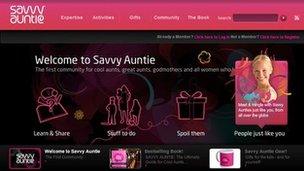Travel trends: thanks to PANKs and peer-to-peer
- Published

Mobiles and tablets have changed how we book holidays and use the web while on our travels
As the nights lengthen and the weather turns wintry, what better time to think about getting away from it all?
In a vast exhibition centre in London this week, the World Travel Market isn't intended as a consumer event. For the trade, it gives an opportunity to look ahead to the tourism industry's next destinations.
As ever, it's a business with a lot of change going on. And you can tell something's up when Ryanair is showing a bit of humility and shifting its business model to one which actually wants to be liked by its customers.
With a profits warning on Monday at the Irish carrier, Michael O'Leary is on a charm offensive. I've met him, and believe me: he knows how to turn on the Irish charm.
He's introducing allocated seats from February, replacing the boarding scrum and ensuring families can sit together.
Penalties are being cut back for changing booking details or reissue of boarding passes. You can now get an early morning red-eye flight without infuriating interruption by a loud tannoy announcement trying to flog you scratch cards.
And following pressure from his client airports who want to boost retail takings, the Ryanair boss is allowing for an extra small carry-on bag - the kind that could carry, let's say, a bottle of whisky or cosmetics.
No-frills long-haul
Ryanair's problem is partly that its European economy is performing so poorly. It's also seeing others getting smarter about offering a better customer experience at low-ish cost, with options that appeal more than Ryanair to the more lucrative but price-conscious business traveller.
IAG, which owns British Airways and Iberia, has learned the lessons of the failed GO!, and now has Vueling in the low-fare airspace. Lufthansa is doing something similar with Germanwings, and Air France with HOP.
Norwegian airline is moving into low-fare long-haul with a no-frills trans-Atlantic service. From next summer, Gatwick to New York could be yours for less than £150.
Low-cost Gulf luxury
The trends in low-fare travel are among the top trends identified each year for the World Travel Market by Euromonitor International, the marketing data company.

China has seen a growth in the cruise industry
In the Middle East, low-fare flying is being re-thought to offer at least a glimpse or two of low-cost luxury experiences.
Indeed, the travel trends reports that flying in general is heading towards less of a cattle herding experience to something perhaps a bit more enjoyable and distinctive.
The trend they've spotted for the UK in particular comes from a website called routehappy.com. It doesn't only sell on destination, price and convenience but on happiness factors.
Similar to TripAdvisor, it harnesses data on how content travellers are with their flights. Launched last April, it may already have had an impact on Ryanair's changed attitude to customer service.
Swap and share
The European trend of choice for Euromonitor is peer-to-peer travel. In tough economic times for much of the continent, this can be about house swaps, car sharing and short-term car hires, or having short-term sofa-surfing lodgers.
On a website such as Vayable, you can meet a local who knows a city's best street food, another guides you through local graffiti art or a homeless man gives you his tour and view of his home city.
Forbes magazine reckons this sector is growing by quarter this year, and it's forecast that the European peer-to-peer market could be worth nearly £10bn by 2017.
The message to hotels: watch out. And while you're at it - get more flexible about what and when you rent out. Business travellers sometimes want to have day room hires for mobile offices. Smart chains are getting occupancy rates up by catering for them.
Mobile concierge
In Africa, the success of the films Madagascar and Lion King are driving a move towards more family-friendly safaris. And there's a big growth in Chinese visitors to the continent.
In China itself, the government has endorsed growth of the cruise industry throughout south-east Asia, much of it around the new $1bn terminal built in Hong Kong. Cruising is a new option for most Chinese people, and there could be opportunities for the Mediterranean, Caribbean and northern Europe cruise sector to look there too.
The mobile phone is, of course, one of the growth trends within mobile. That's not only to book where and when you choose.
It's also the mobile as concierge, with apps the on-demand, real-time source of information to get you round your holiday destination. It would help, of course, if roaming data charges were to fall.
"Move over soccer moms"
And then there are PANKs - "professional aunts, no kids".
PANKs are women who have a close relationship with children of friends or relatives.
The USA is, of course, first to embrace the PANK penny. In 2010, 43% of women between the ages of 15-44 were childless, and as more women choose not to have children, it's only going to grow further.

PANKs are professional woman who spend money on the children of friends and relatives
A US-based website community for aunts and godmothers, Savvy Auntie, copyrighted the demographic term last December, estimating that there are 23m PANKs in the US, roughly one in five in the age group, spending US$9 billion (£5.6bn) annually on children.
To quote the website: "Move over soccer moms. There's a new group of smart, powerful women spenders out there. PANKs have time, income and a passion for purchasing the best for the kids in their lives," says Leslie Gaines-Ross, chief reputation strategist for Weber Shandwick.
Nearly half of them told Savvy Auntie they enjoy travelling with nieces and nephews.
Further American research shows they like to go to Disney theme parks and Hawaii, and when they leave the US, the UK is towards the top of their to-do lists.
As women tend to make most travel decisions, the cruise industry targets them with its marketing, but it's careful to assume they're not thinking as mothers, or as wives.
Euromonitor doesn't explain why this doesn't apply to uncles the same way, with the marketing potential of Professional Uncles with No Kids. Perhaps the PUNK acronym isn't quite what the marketers had in mind.